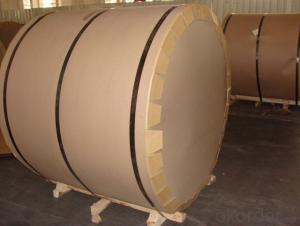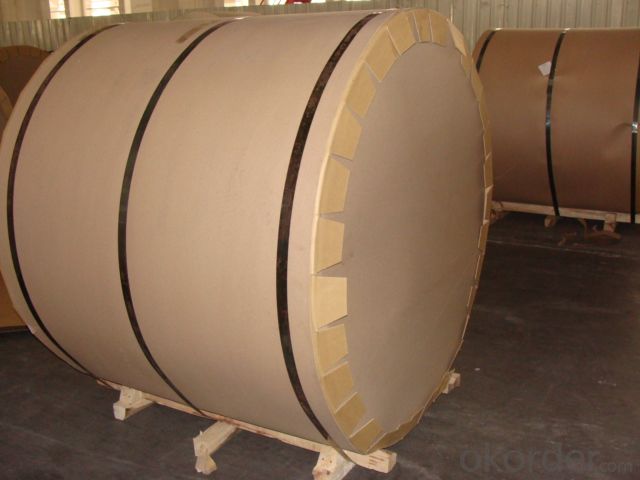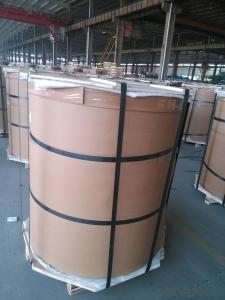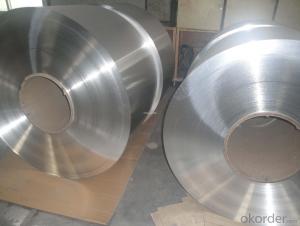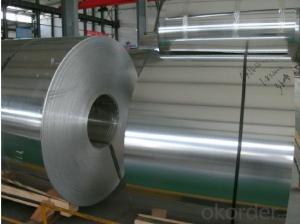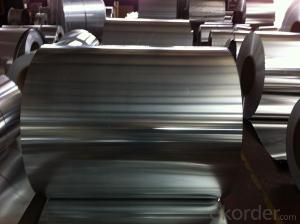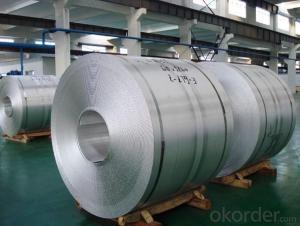6061 Aluminum Coil Price - D.C AA8079 Aluminum Coils Used as Building Material
- Loading Port:
- Shanghai
- Payment Terms:
- TT OR LC
- Min Order Qty:
- 5 m.t.
- Supply Capability:
- 10000 m.t./month
OKorder Service Pledge
OKorder Financial Service
You Might Also Like
Specification
1.Structure of D.C AA8079 Aluminum Coils used as BUiding Material Description
D.C AA8079 Aluminum Coils used as BUiding Material widly used in decoration field. For the painting, it depends on the using evironment. If you use in the open air, we recommend the PVDF coated aluminium coils. This kind of painting can last 15-20 years. If you use in the room, we recommend PE coated aluminium coils. The price is much more competitive.
Direct Continuous Aluminium Foil Stock in Coil is one semi-finished aluminium material. This strip can be rolled down to aluminium foil.The final thickess can be 5-20 microns. Aluminium foil is soft, ductile and with a silver-white luster which can be widely used in a large scare of fields.
2.Main Features of D.C AA8079 Aluminum Coils used as BUiding Material
a.Competitive price---We have our own mills and can produce mill finished aluminium coils, so we can control the production cost better.
b.Professional after-sale service---We have more than 15 years exportation experience and you need not worry about the exporation problems.
c.Fast delivery time---We can control the delivery time within 35 days.
3.D.C AA8079 Aluminum Coils used as BUiding Material Images
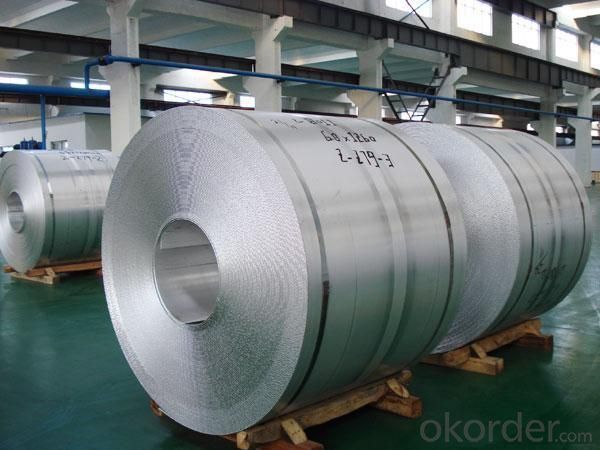
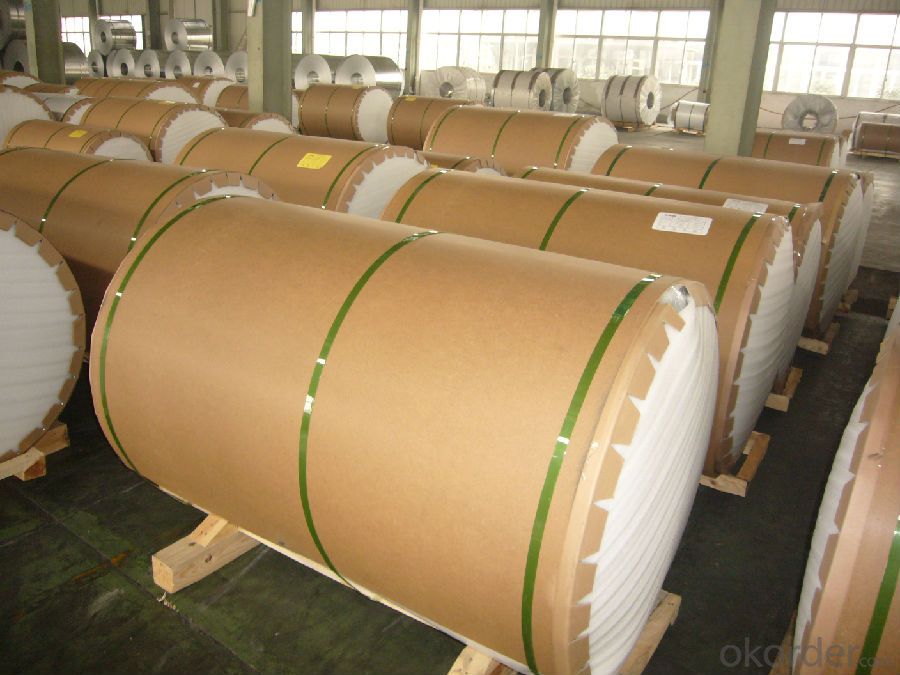
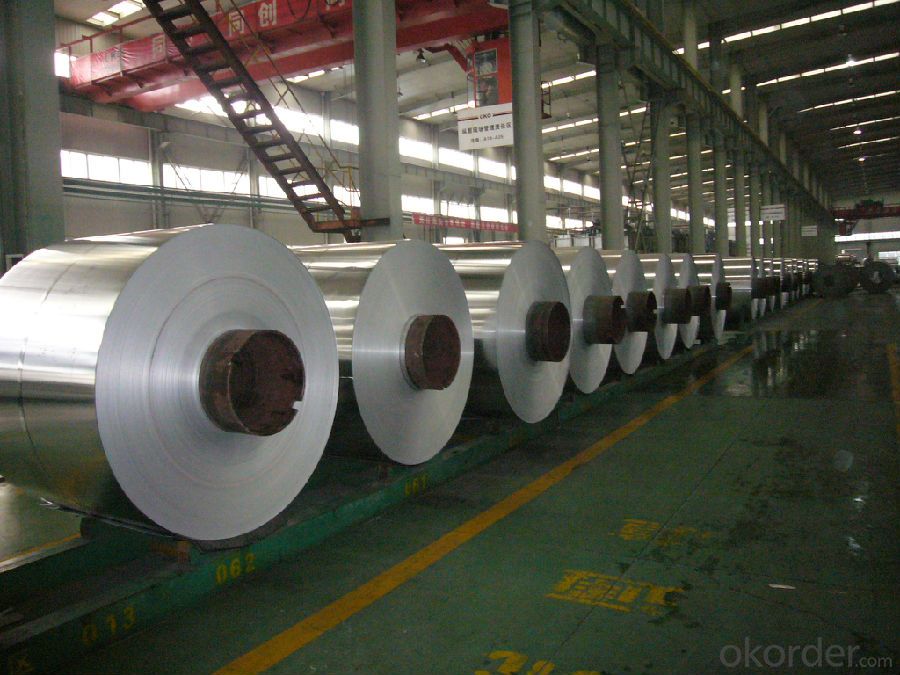
4.D.C AA8079 Aluminum Coils used as BUiding Material Specification
Alloy | AA8079 |
Temper | H14, H16, H18, H22, H24, H26, H32, O/F |
Thickness | 0.2mm -- 100mm |
Width | 30mm -- 1700mm |
Standard | GB/T 3880-2006,EN |
5. FAQ of D.C AA8079 Aluminum Coils used as BUiding Material
A.How to guarantee the quality?
Customers are welcome to our mill to visit and check the products. Besides, we can arrange a third party to test D.C AA8079 Aluminum Coils used as BUiding Material.
B.When will you deliver the products?
D.C AA8079 Aluminum Coils used as BUiding Material will be delivered within 35 days after receiving advanced payment or original L/C.
- Q: I need help with 3 main ideas for a aluminum and copper chloride lab. I need evidence for these 3 ideas that what happened was a chemical reaction.
- Change in mass, change in color, change in temp, change in ...
- Q: Can aluminum coils be used in the production of aluminum garage doors?
- Yes, aluminum coils can be used in the production of aluminum garage doors. Aluminum coils are often used as the primary material for manufacturing aluminum garage doors due to their durability, lightweight nature, and resistance to corrosion.
- Q: What are the recognized standards that dictate the quality of aluminum coil?
- <p>Yes, there are several standards that define the quality of aluminum coil. These include ASTM B209, which specifies requirements for aluminum and aluminum alloy flat sheet, coil, and plate for general usage. ASTM B210 covers aluminum and aluminum alloy sheet and plate for heat-treating. Additionally, EN 485 is a European standard that specifies the requirements for aluminum and aluminum alloy cold-rolled sheets, strips, and plates. These standards outline dimensions, chemical composition, mechanical properties, and other quality aspects to ensure the material meets industry requirements.</p>
- Q: How are aluminum coils used in the production of furniture?
- Aluminum coils are widely used in the production of furniture due to their various beneficial properties. These coils are typically made from high-quality aluminum alloy, which offers excellent corrosion resistance, durability, and lightweight characteristics. In the furniture manufacturing process, aluminum coils are primarily used for creating the framework or structure of the furniture pieces. They are often formed into various shapes and profiles to provide the necessary strength and rigidity required for the furniture item. The coils can be easily bent, cut, and joined together to create different components such as chair frames, table legs, or cabinet structures. This versatility allows manufacturers to design and produce furniture with intricate and customized shapes and sizes. Moreover, aluminum coils are highly adaptable to different finishing techniques. They can be anodized, painted, or powder-coated to enhance their aesthetic appeal and provide additional protection against wear and tear. This makes aluminum-coiled furniture resistant to scratches, stains, and fading, ensuring longevity and a visually appealing appearance. Additionally, aluminum coils offer a lightweight alternative to other materials like steel or wood, making furniture easier to transport and handle. This is particularly advantageous in the case of outdoor furniture or pieces that need to be frequently moved or rearranged. Furthermore, aluminum is a sustainable and environmentally friendly material. It is 100% recyclable, allowing manufacturers to reduce their carbon footprint and contribute to a more sustainable production process. In summary, aluminum coils play a vital role in the production of furniture by providing strength, durability, versatility, and aesthetic appeal. Their use in furniture manufacturing helps create lightweight, customizable, and sustainable furniture pieces that meet the demands of modern consumers.
- Q: What does 1060 of the 1060 Aluminum rolls stand for?
- Can aluminium rolls be classified into nine categories? One series is the 1060 series, which represents the 1050106010701000 series aluminum plate, also known as pure aluminum. In all the series, the 1000 series belongs to a series with the largest amount of aluminum.
- Q: Can aluminum coils be painted for custom designs?
- Yes, aluminum coils can be painted for custom designs. Painting aluminum coils allows for endless possibilities in terms of customization and aesthetics. The coils can be painted with various colors, patterns, and designs to suit individual preferences and requirements. The paint application process involves cleaning the surface, applying a primer, and then applying the desired paint or coating. By painting aluminum coils, it is possible to create unique and eye-catching custom designs for a range of applications, including architectural elements, signage, automotive parts, and more. Additionally, the paint helps protect the aluminum from corrosion and enhances its durability.
- Q: Can aluminum coils be recycled multiple times?
- Yes, aluminum coils can be recycled multiple times. Aluminum is a highly recyclable material, and the recycling process for aluminum coils involves melting them down to create new coils. This means that aluminum coils can be recycled indefinitely without losing their properties or quality.
- Q: How do aluminum coils compare to plastic coils in terms of durability?
- Aluminum coils are generally more durable than plastic coils. They are resistant to corrosion and can withstand high temperatures, making them suitable for various applications. Plastic coils, on the other hand, are more prone to wear and tear, especially in harsh environments or with heavy usage. While both types have their own advantages, aluminum coils are generally considered to be more durable in the long run.
- Q: How do aluminum coils perform in high humidity environments?
- Aluminum coils perform well in high humidity environments due to their inherent resistance to corrosion. Unlike many other metals, such as iron or steel, aluminum does not rust when exposed to moisture. This makes it a suitable choice for applications where high humidity is a concern, such as air conditioning systems or refrigeration units. The corrosion resistance of aluminum is primarily due to the formation of a thin layer of aluminum oxide on its surface when exposed to oxygen. This oxide layer acts as a protective barrier against further oxidation, preventing the metal from deteriorating even in humid conditions. Moreover, the lightweight nature of aluminum allows for better heat transfer and energy efficiency in cooling systems. This property makes aluminum coils a popular choice as heat exchangers, as they can effectively transfer heat from the air or fluid passing through them. Additionally, aluminum coils are typically coated with a protective layer or treated with a corrosion-resistant coating to further enhance their performance in high humidity environments. These coatings provide an extra layer of protection against moisture and other corrosive elements, ensuring the longevity and reliability of the coils. In summary, aluminum coils are highly suitable for high humidity environments due to their resistance to corrosion and their efficient heat transfer properties. The combination of these factors makes them a reliable choice for various applications where moisture is a concern.
- Q: Is it appropriate to use a hammer to open or unroll an aluminum coil?
- <p>Using a hammer to open an aluminum coil is not recommended. Hammers are designed for striking and can easily damage the aluminum, causing dents or deformation. Instead, use a pry bar or a similar tool to gently unroll the coil without applying excessive force. This will help prevent damage to the aluminum and ensure it remains in good condition for further use.</p>
Send your message to us
6061 Aluminum Coil Price - D.C AA8079 Aluminum Coils Used as Building Material
- Loading Port:
- Shanghai
- Payment Terms:
- TT OR LC
- Min Order Qty:
- 5 m.t.
- Supply Capability:
- 10000 m.t./month
OKorder Service Pledge
OKorder Financial Service
Similar products
Hot products
Hot Searches
Related keywords
